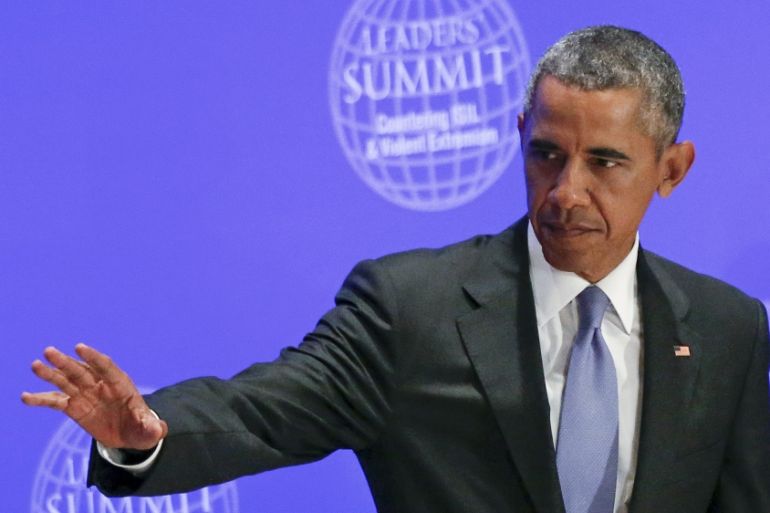Obama urges world leaders to hold course against ISIL
US president says the US-led coalition has grown to 60 nations and has beaten ISIL back from terrain it has held.

New York – US President Barack Obama has urged members of a US-led coalition to hold course in its fight against the Islamic State of Iraq and the Levant (ISIL) against a backdrop of growing Russian military deployments to bolster Syrian President Bashar al-Assad’s government.
Obama said the US-led coalition had grown to 60 nations with the addition of new members Nigeria, Tunisia and Malaysia and had beaten back ISIL from a third of the terrain it once controlled in Iraq.
Keep reading
list of 4 itemsAustin confirms Russians deployed to airbase housing US military in Niger
What’s next as ‘heavy-handed’ US negotiates pullout from Niger?
Putin says ‘radical Islamists’ behind Moscow concert hall attack
“We’ve seen that ISIL can be defeated on the battlefield where there is sound organisation and a government and military that is coordinating with this coalition and with our diplomatic efforts,” Obama told leaders at a summit of an anti-ISIL coalition.
|
|
“It will require diligence, focus and sustained effort by all of us.”
ISIL fighters are being beaten in northeast Syria and have been repelled from almost all of the Turkey-Syrian border across which thousands of foreign fighters have travelled from overseas to swell its ranks, Obama said at UN headquarters.
“Like terrorists and tyrants throughout history ISIL will eventually lose because it has nothing to offer but suffering and death,” Obama said. “Those who are labouring under their control, it is a stark and brutal life that does not appeal to people in the long term.”
Obama did not talk about Russia’s growing military presence in Syria, but said that he was willing to work with Moscow, Tehran and others “to begin a transition process” that would involve a “new leader” to replace Assad.
Obama and his Russian counterpart, Vladimir Putin, traded barbs and frosty glances on Monday amid deepening tensions over a Syrian conflict that has claimed some 250,000 lives and sent millions more fleeing from their homes.
READ MORE: US ‘willing’ to work with Russia and Iran on Syria
Both leaders agree on the need to defeat ISIL, but Putin says this should be achieved by backing Moscow’s long-standing ally in the region, Assad. Obama says the Syrian leader has killed too many of his own people to be a legitimate leader.
While they disagree on the key issue of Assad’s future, there have been signs of willingness to cooperate. They held a 90-minute meeting on the crises in Ukraine and Syria and, during a gourmet lunch with other leaders, shook hands and clinked their wine glasses.
After the meeting, Putin said the talks were “businesslike and very frank” and described an “opportunity to work on joint problems together” with the US. The two leaders agreed that their armed forces should hold talks to avoid coming into conflict in Syria.
In recent weeks, Russia has deployed combat aircraft, tanks and other gear to Syria, while the US has acknowledged problems with its effort to roll back ISIL from strongholds in Iraq and Syria despite more than 7,000 air strikes since August 2014.
A $500m Pentagon scheme to train and arm more than 5,000 moderate rebels to fight ISIL has been marred by recruitment issues, defections and delays. The year-long project has yielded only a handful of fighters so far.
At Tuesday’s meeting, UN Secretary-General Ban Ki-moon warned that UN data shows that radicals are currently travelling to join conflicts overseas from more than 100 countries – representing a 70 percent increase over recent years.
“Violent extremist groups … pose a direct threat to international security, mercilessly target women and girls, and undermine universal values of peace, justice and human dignity,” he said.
“Addressing this challenge goes to the heart of the mission of the United Nations.”
On Tuesday, the US imposed sanctions on more than 30 ISIL leaders, financial figures, supporters and affiliated groups in an effort to block the group from world financial systems. They included citizens of Britain, France, Russia, Syria, Morocco, Saudi Arabia, and Tunisia.
Follow James Reinl on Twitter: @jamesreinl